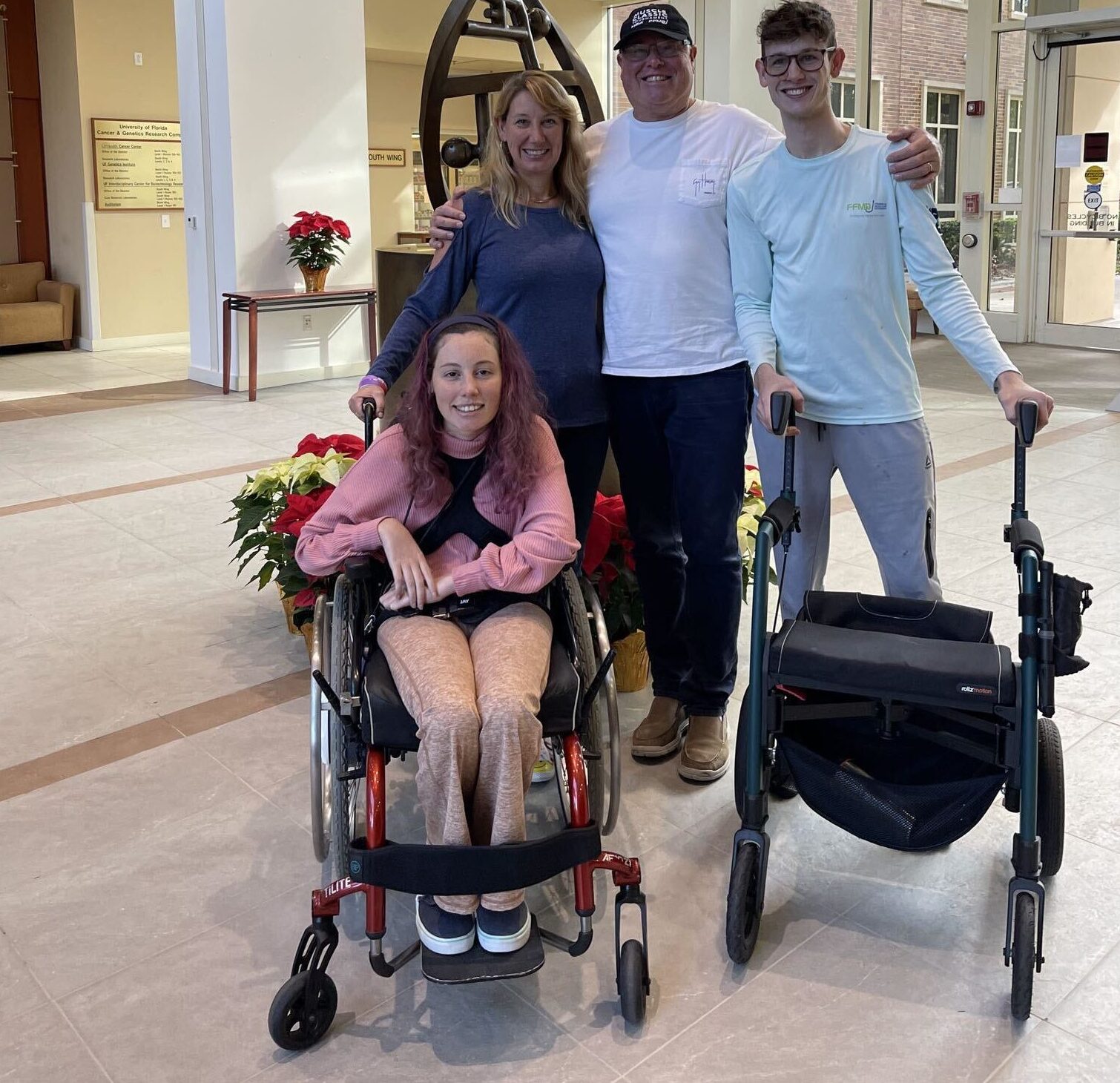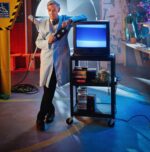Parents, caregivers of twins with FA adapt, say ‘every day is a gift’
'Don't take no for an answer,' says mother of twins with FA

The Maugee family, from left to right: Isabel, Caroline, Eric, and Christian. (Courtesy of the Maugee family)
In 2007, 8-year-old Isabel Maugee began having gait problems while playing soccer. Caroline Maugee and her husband, Eric, thought their daughter had knock knees.
A year later, the couple was shocked when Isabel and her twin brother, Christian, were diagnosed with a disease they had never heard of — Friedreich’s ataxia (FA). And then they learned that they, as well as their oldest son, Stephane Maugee, 28, were carriers of the hereditary disease that causes loss of muscle control and coordination.
“Our world got turned upside down, and it’s never been the same,” says Caroline Maugee, who is her daughter’s full-time caregiver. “So we adapt the best we can.”
Isabel and Christian Maugee are now 26. Isabel Maugee is mostly nonverbal, uses a wheelchair, and has worsening vision. Christian Maugee also uses a wheelchair but lives independently. He is a doctoral student at the University of Florida in Gainesville and is studying genetics and genomics in hopes of finding a cure for FA.
‘Scary’ uncertainty
For a while, Isabel Maugee’s symptoms had been progressing, while Christian had yet to show any signs. For Caroline Maugee, it was a time of mixed emotions. She was glad her son was doing well, but the uncertainty about his future was “very scary.”
“We always told him that FA is sleeping, it’s dormant,” Caroline Maugee says. “When they were little, we started going to all these specialists, and we ended up doing a clinical trial. They knew Christian had FA, but he was very valuable because he had no symptoms.”
When Christian Maugee was 13 or 14, everything changed. He began having trouble walking to school and performing on the balance beam. By that time, Isabel Maugee was already using a wheelchair.
These days, Christian Maugee rises early and drives himself to school. He’ll soon have hand controls and a device to open his SUV trunk, retrieve his wheelchair, and deliver it to the driver-side door. He spends a full day in the research lab and, most weeks, has physical, speech, or occupational therapy. Sometimes he goes to the gym to improve his leg strength.
Every month, his parents drive nearly five hours from Fort Lauderdale, Florida, to his apartment to shop for groceries, do laundry, and help in any other way they can.
“It’s a big worry, but he’s doing great,” says Caroline Maugee. “He’s got a bunch of friends and a good support system up there.”
She says he’s very focused on making a difference in the FA scientific community.
“I think Isabel is Christian’s biggest push to finish his PhD, find a treatment, and keep working on ataxia research,” says Caroline Maugee. “His sister is still fighting and smiling, but she’s sad because he’s in a wheelchair, and he’s sad that her speech is so affected.”
Christian Maugee also plays a scientist in a new video series called “The Science Guy: Back in the Lab for FA.” It stars Bill Nye, who was the host of the science education TV show “Bill Nye the Science Guy.”
Adapting guides daily life
Each morning, Caroline Maugee gives Isabel Maugee a medication to slow FA’s progression. (Christian Maugee also takes it.) She also helps her with a CPAP machine to assist with lung function.
After bathing Isabel Maugee, her mother positions her at the dining room table and gives her some daily supplements. Once a week, it’s followed by physical therapy. After lunch together, the two typically visit a store or go for a drive.
“Her mind is all there, so she has her thoughts and is aware of everything around her. So it’s very frustrating,” says Caroline Maugee. “But we try to be goofy and fun around her and make light of life.”
Isabel Maugee is sassy and funny, Caroline Maugee says, and enjoys her friends on social media. Most nights, she and her husband put Isabel Maugee in a standing frame that helps her circulation and allows her to look outside. The house is equipped with ramps, a toilet chair, and a specially designed bathtub. They also have an adapted van.
The whole family spends as much time together as possible, going on trips and enjoying the beauty that life brings.
“We celebrate everything, and every day is a gift,” says Caroline Maugee, who is active with FA advocacy groups such as the Friedreich’s Ataxia Research Alliance (FARA). The family recently presented its third annual Runway to the Cure, raising more than $130,000 for FARA research.
Caroline Maugee says it makes her feel better to give back and try to help FA families make the best of a very challenging situation.
“Live for today, and don’t take no for an answer,” she says. “Just because there’s a different way to do it, doesn’t mean you can’t do it. Adapt, adapt, adapt. Live for today, and don’t take no for an answer.”








